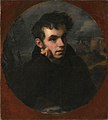Golden Age of Russian Poetry
Appearance
Golden Age of Russian Poetry is the name traditionally applied by Russian philologists to the first half of the 19th century.[1] It is also called the Age of Pushkin, after its most significant poet (in Nabokov's words, the greatest poet this world was blessed with since the time of Shakespeare[2]). Mikhail Lermontov and Fyodor Tyutchev are generally regarded as two most important Romantic poets after Pushkin.[3] Vasily Zhukovsky and Konstantin Batyushkov are the best regarded of his precursors. Pushkin himself, however, considered Evgeny Baratynsky to be the finest poet of his day.[4]
References
- ^ John, Gary (2009-08-07). "LESSON 4 The Golden Age: Aleksandr Pushkin". Department of Slavic and Central Asian Languages , University of Minnesota. Retrieved 2012-03-23.
- ^
Boyd, Brian (2011). Stalking Nabokov: Selected Essays. New York: Columbia University Press. p. 203. ISBN 0231158564.
{{cite book}}:|access-date=requires|url=(help) - ^ Nabokov, Vladimir (1944). Three Russian Poets: Selections from Pushkin, Lermontov, and Tyutchev. New York: Norfolk: New Directions.
- ^ "Prominent Russians: Yevgeny Baratynsky".




